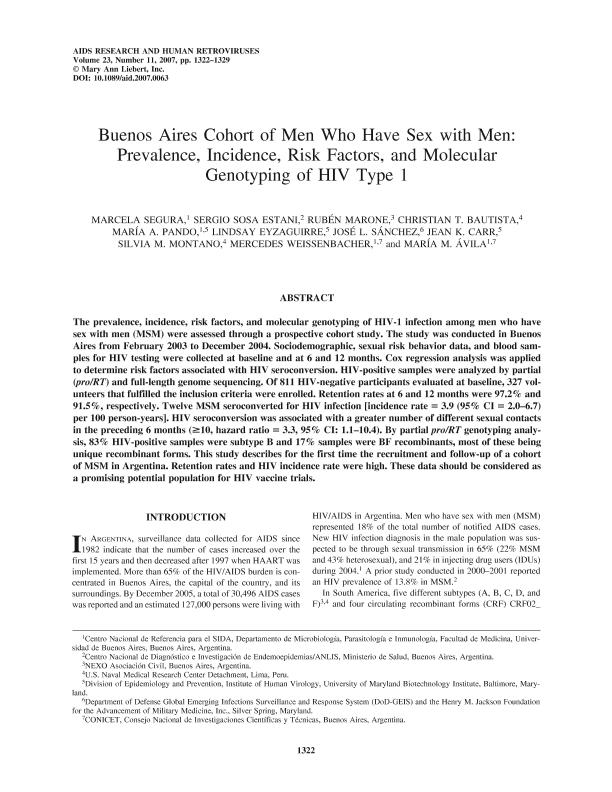Artículo
Buenos Aires cohort of men who have sex with men: Prevalence, incidence, risk factors, and molecular genotyping of HIV type 1
Segura, Marcela; Sosa-Estani, Sergio Alejandro ; Marone, Rubén; Bautista, Christian T.; Pando, María de los Ángeles
; Marone, Rubén; Bautista, Christian T.; Pando, María de los Ángeles ; Eyzaguirre, Lindsay; Sánchez, José L.; Carr, Jean K.; Montano, Silvia M.; Weissenbacher, Mercedes Crecencia
; Eyzaguirre, Lindsay; Sánchez, José L.; Carr, Jean K.; Montano, Silvia M.; Weissenbacher, Mercedes Crecencia ; Avila, Maria Mercedes
; Avila, Maria Mercedes
 ; Marone, Rubén; Bautista, Christian T.; Pando, María de los Ángeles
; Marone, Rubén; Bautista, Christian T.; Pando, María de los Ángeles ; Eyzaguirre, Lindsay; Sánchez, José L.; Carr, Jean K.; Montano, Silvia M.; Weissenbacher, Mercedes Crecencia
; Eyzaguirre, Lindsay; Sánchez, José L.; Carr, Jean K.; Montano, Silvia M.; Weissenbacher, Mercedes Crecencia ; Avila, Maria Mercedes
; Avila, Maria Mercedes
Fecha de publicación:
12/2007
Editorial:
Mary Ann Liebert
Revista:
Aids Research and Human Retroviruses
ISSN:
0889-2229
Idioma:
Inglés
Tipo de recurso:
Artículo publicado
Clasificación temática:
Resumen
The prevalence, incidence, risk factors, and molecular genotyping of HIV-1 infection among men who have sex with men (MSM) were assessed through a prospective cohort study. The study was conducted in Buenos Aires from February 2003 to December 2004. Sociodemographic, sexual risk behavior data, and blood samples for HIV testing were collected at baseline and at 6 and 12 months. Cox regression analysis was applied to determine risk factors associated with HIV seroconversion. HIV-positive samples were analyzed by partial (pro/RT) and full-length genome sequencing. Of 811 HIV-negative participants evaluated at baseline, 327 volunteers that fulfilled the inclusion criteria were enrolled. Retention rates at 6 and 12 months were 97.2% and 91.5%, respectively. Twelve MSM seroconverted for HIV infection [incidence rate = 3.9 (95% CI = 2.0-6.7) per 100 person-years]. HIV seroconversion was associated with a greater number of different sexual contacts in the preceding 6 months (≥10, hazard ratio = 3.3, 95% CI: 1.1-10.4). By partial pro/RT genotyping analysis, 83% HIV-positive samples were subtype B and 17% samples were BF recombinants, most of these being unique recombinant forms. This study describes for the first time the recruitment and follow-up of a cohort of MSM in Argentina. Retention rates and HIV incidence rate were high. These data should be considered as a promising potential population for HIV vaccine trials.
Archivos asociados
Licencia
Identificadores
Colecciones
Articulos(OCA HOUSSAY)
Articulos de OFICINA DE COORDINACION ADMINISTRATIVA HOUSSAY
Articulos de OFICINA DE COORDINACION ADMINISTRATIVA HOUSSAY
Citación
Segura, Marcela; Sosa-Estani, Sergio Alejandro; Marone, Rubén; Bautista, Christian T.; Pando, María de los Ángeles; et al.; Buenos Aires cohort of men who have sex with men: Prevalence, incidence, risk factors, and molecular genotyping of HIV type 1; Mary Ann Liebert; Aids Research and Human Retroviruses; 23; 11; 12-2007; 1322-1329
Compartir
Altmétricas



